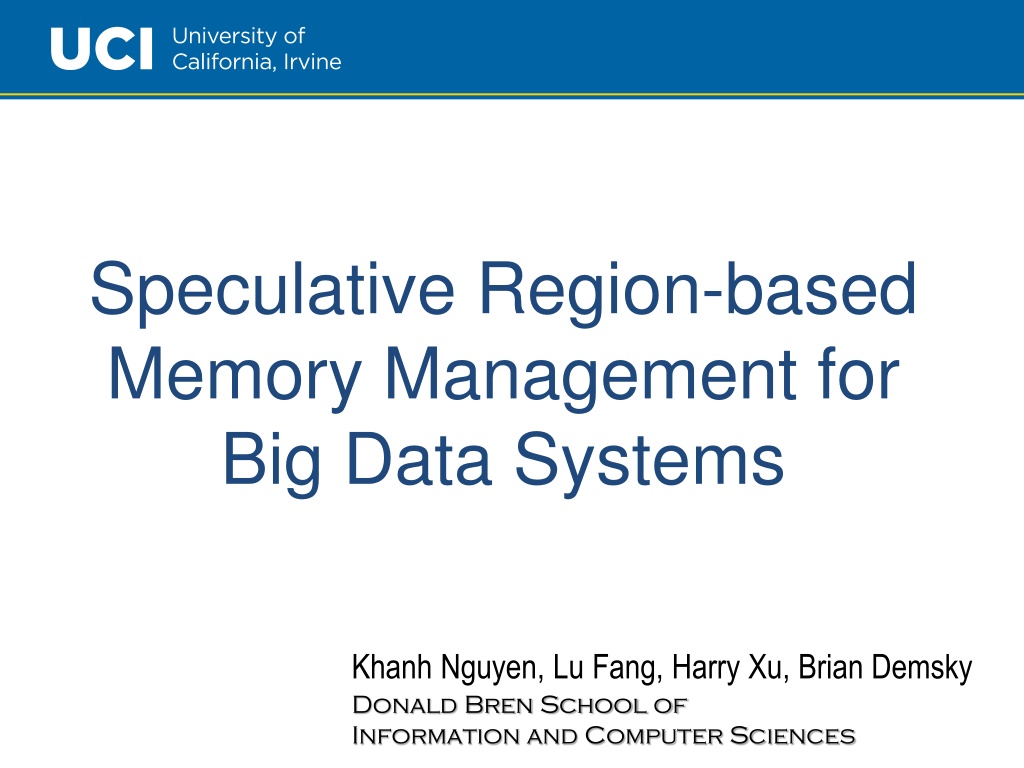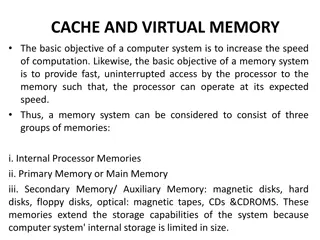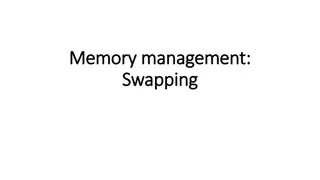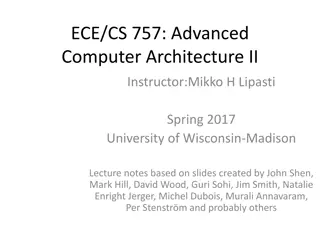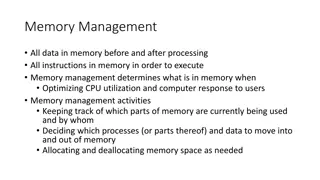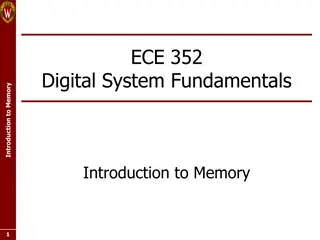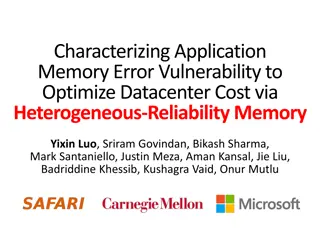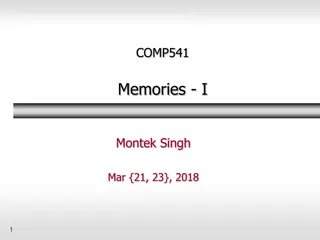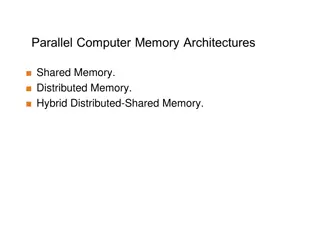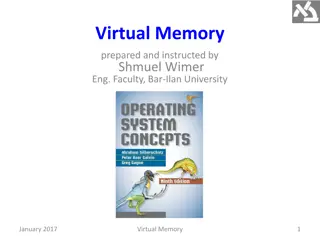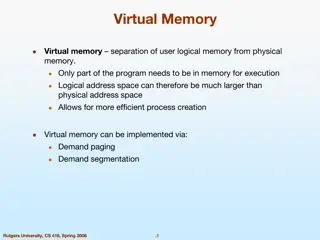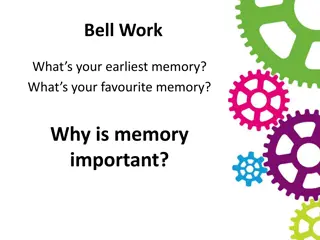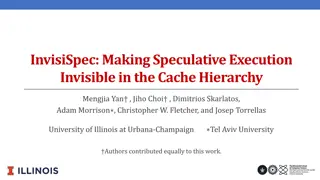Speculative Region-based Memory Management for Big Data Systems
This research focuses on the challenges faced by big data systems, such as JVM crashes due to OutOfMemory errors and high management costs. It introduces a speculative region-based memory management technique to address these issues, aiming to optimize memory usage and improve system scalability. The study highlights the significance of dynamic memory management in handling large-scale data processing tasks efficiently.
Download Presentation

Please find below an Image/Link to download the presentation.
The content on the website is provided AS IS for your information and personal use only. It may not be sold, licensed, or shared on other websites without obtaining consent from the author. Download presentation by click this link. If you encounter any issues during the download, it is possible that the publisher has removed the file from their server.
E N D
Presentation Transcript
Speculative Region-based Memory Management for Big Data Systems Khanh Nguyen, Lu Fang, Harry Xu, Brian Demsky Donald Bren School of Information and Computer Sciences
BIG DATA 2
BIG DATA Scalability JVM crashes due to OutOfMemory error at early stage 3
A moderate-size application on Giraph with 1GB input data can easily run out of memory on a 12 GB heap [Bu et al, ISMM 13] 4
BIG DATA Scalability JVM crashes due to OutOfMemory error at early stage High cost of the managed runtime is a fundamental problem! Management cost GC time accounts for up to 50% of the execution time [Bu et al, ISMM 13] 5
Existing Work Facade [Nguyen et al, ASPLOS 15] Broom [Gog et al, HotOS 15] Huge manual effort from developers This work: Purely dynamic technique 6
Control Path vs. Data Path Pipeline construction Process the actual data Job state management Code size is small (36%) Perform optimization Create most of the runtime objects (95%) [Bu et al, ISMM 13] 7
Execution Pattern Data-processing functions are iteration- based Each iteration processes a distinct data partition Iterations are well-defined 8
GraphChi [Kyora et al, OSDI12] public interface GraphChiProgram <VertexDataType, EdgeDataType> { public void update(ChiVertex<VertexDataType, EdgeDataType> vertex, GraphChiContext context); public void beginIteration(GraphChiContext ctx); public void endIteration(GraphChiContext ctx); public void beginInterval(GraphChiContext ctx, VertexInterval interval); public void endInterval(GraphChiContext ctx, VertexInterval interval); public void beginSubInterval(GraphChiContext ctx, VertexInterval interval); public void endSubInterval(GraphChiContext ctx, VertexInterval interval); } 9
Weak Iteration Hypothesis Data objects do not escape iteration boundaries GC run in the middle is wasted PageRank Twitter graph Control objects do escape iteration boundaries 10
Region-based Memory Management Region definition Management: Allocation Deallocation 11
Advantages Low overheads Improved data locality More flexible than stack allocation No GC burden 12
Challenges Escaping control objects Developers are responsible for semantic correctness Facade annotation & refactoring static analyses? Broom specialized API Precise objects lifetime required! 13
Proposed Solution Speculative Region Allocation annotate iteration boundary: - iteration_start - iteration_end Algorithms to guarantee program s correctness automatically 14
Observations nested Iterations executed by multiple threads iteration_ID, thread_ID 15
Region Semi-lattice heap void main() { JOIN OPERATOR T,* iteration_start for( ) { iteration_start for( ) { 1,t1 1,t2 iteration_start for( ) { } iteration_end region 2,t1 2,t2 } iteration_end 3,t1 3,t2 } iteration_end GC never touches regions } //end of main 16
Speculative Region Allocation Parent iteration_start Child iteration_start iteration_end iteration_end 17
Components of Our Approach Speculative region allocation Track inter-region references Update boundary set Recycle regions Boundary set promotion 18
Remember Inter-Region References: Case 1 y,ti x,ti a.f = b a b b boundary set 19
Remember Inter-Region References: Case 2 y,tj x,ti a = b.f b f c c boundary set 20
Region Recycling Algorithm 3,t1 T,* 1,t1 1,t2 2,t1 2,t2 3,t1 3,t2 JOIN( , ) = 1,t1 2,t1 1,t1 boundary set 21
Region Recycling Algorithm 3,t1 T,* 1,t1 1,t2 2,t1 2,t2 3,t1 3,t2 JOIN( , ) = 2,t1 2,t2 T,* boundary set 22
Region Recycling Algorithm 3,t1 T,* 1,t1 1,t2 2,t1 2,t2 3,t1 3,t2 boundary set 23
Handling of Intricacies Escape via the stack Data-race-free object relocation Details are in the paper 24
Conclusions Goal: Reduce user s effort Solution: Speculative region allocation The cost of object promotion is considerable Can be reduced by adaptively allocating objects: feedback-directed allocation policy Status: In the process of implementing & evaluating in the OpenJDK 25
Thank you! 26
